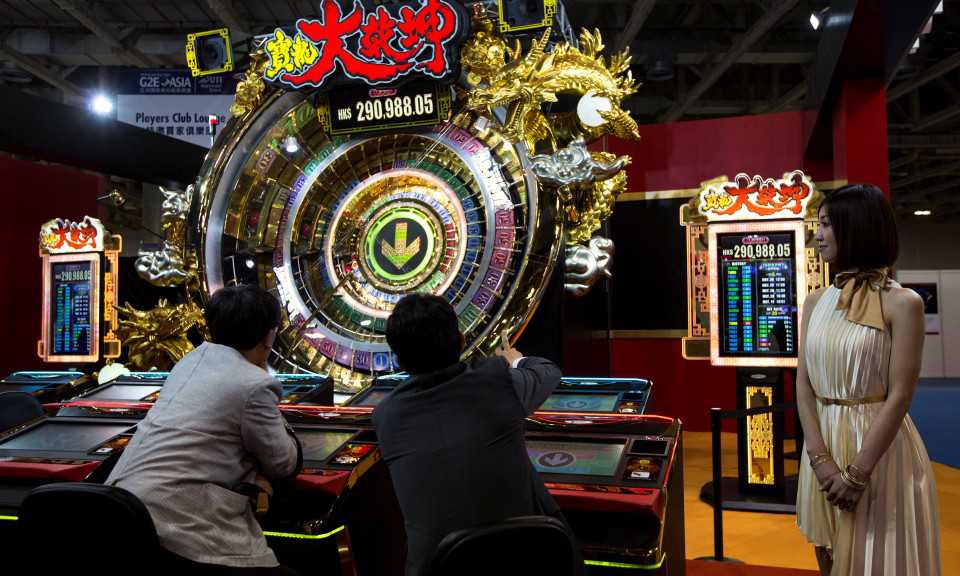Three questions about Japan’s bet on casinos
26 January, 2018

Visitors sit in front of lucky wheels made by the Japanese company Sega Sammy Creation, at the Global Gaming Expo Asia in Macau, on April 19, 2017. Photo: Reuters / Tyrone Siu
Prime Minister Shinzo Abe has the gambling maxim “never bet against the house” firmly in mind as he wagers big on Las Vegas boosting Japan’s economy
For Japanese Prime Minister Shinzo Abe, the stakes are high as he moves to open up his country’s gaming sector. Only a minority of Japan’s 127 million people support casinos, fearing crime, addiction and personal bankruptcies. But Abe is rolling the dice.
In December 2016, Abe rammed through legislation to legalize gaming houses (at the time, only 12% of Japanese were in favor). Since then, bureaucrats have dithered on writing up clear rules on licensing, taxation, zoning and social safeguards. That’s about to change. In his January 22 speech to open the parliament session, Abe said that getting so-called integrated resorts – which package casinos with hotels, malls and the like – up and running is a priority.
That’s music to the ears of Vegas magnates like Sheldon Adelson, who calls Japan the “holy grail.” His Las Vegas Sands plans to drop about US$10 billion on a Tokyo facility to complement its assets in Macau and Singapore. For Adelson and his ilk, Japan has long stood among the most attractive untapped markets anywhere.
But the answers to three questions stand in the way of Abe’s audacious bet paying off.
One: Is Japan too late to the party? Abe, Adelson and companies like Wynn Resorts, MGM Resorts and Melco Crown hope the Asian gaming pie will keep growing bigger and bigger. Perhaps it will – but Japan will be vying for the same mainland high rollers currently placing bets in Australia, Cambodia, India (in the western city of Goa), Macau, Malaysia, New Zealand, the Philippines, Singapore and South Korea. Thailand may be next.
Granted, Japan boasts considerable cultural attributes. It has four seasons and enviable topographical diversity featuring beach resorts, “onsen” spa towns, some of Asia’s best skiing and fabled culinary traditions. Package-tour opportunities could indeed give Japan a leg up on the competition. Then again, sky-high costs and an aversion to sharing-economy offerings are big potential demerits.
Abe, too, is betting on decent relations with Xi Jinping’s China. In 2017, President Xi gut-punched Korea by canceling a range of mainland tours in retaliation for Seoul hosting US weapons systems. Xi could inflict similar damage on Japan at any moment. There’s always the risk of the great Chinese slowdown economists have long feared leaving Japan with a losing hand. And what if Beijing decides to open its own casinos?
Two: Will bureaucrats spoil the fun? Officials here are weeding through 130 pages of suggestions about how to gussy-up an industry known more for vice than social virtue. They include bans on ATMs, limiting locals’ access to gaming floors, demands that punters provide tax-identification numbers, and strict ratios on gaming spaces relative to family-friendly attractions. The local American and British business lobbies have been working to ensure that Tokyo doesn’t go too far with airbrushing efforts. A central fear is that Japan might follow Korea’s lead and bar the country’s own nationals from entry.
Irony abounds. While Vegas-style gaming does not yet exist in Japan, gambling is already among Japan’s biggest industries in terms of revenues. Japanese engage in a collective fiction that pachinko parlors, cycling tracks, horse-racing stadiums, boating circuits and other betting mediums are just good clean fun. Even so, there’s great trepidation about making gambling official, raising the risk bureaucrats will overdo it.
Three: Why only Tokyo? Japan is Tokyo, and Tokyo is Japan, it’s often said. To get the most bang for its gaming yen, Abe’s government should place casinos in less flush cities and regions. Already enjoying a pre-2020 Olympics building boom, Tokyo should share the wealth with, say, Fukuoka or the Tohoku region. Fukuoka is the commercial hub of the western island of Kyushu, and it benefits from proximity to Beijing, Busan, Seoul, Shanghai, Taipei and other key Asian metropolises.
Tohoku, meantime, is still reeling from a giant 2011 earthquake and nuclear crisis at Fukushima. Abe’s government argues Tohoku is safe for tourism. He can prove it by steering Vegas magnates 239 kilometers north of Tokyo to pump new life into regions being left behind. Okinawa is another option, and an attractive one given its bevy of beaches and unique culture.
That would be a tough sell for titans like Adelson who seem set on downtown Tokyo. In lobbying Abe, he highlights his expertise in “MICE,” or the meetings, incentives, conventions and exhibitions business. Speaking in Tokyo in February 2017, Adelson said: “There are some countries that think if you put an integrated resort somewhere in the boonies, you will attract a lot of other businesses. That’s a mistake.”
The real mistake, though, is to concentrate even more economic power and tax revenues in Japan’s biggest and wealthiest city. Yes, the house always wins. But Abe would do well to ensure that all Japanese benefit from the nightly take.
